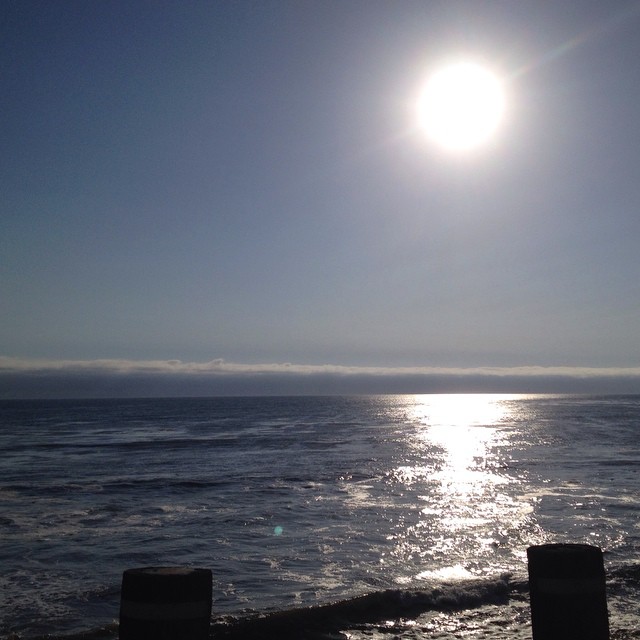
I want to end the week with a few notes about our homeschooling high points. Olav Hauge was a big hit, and apart from a side-trip to Elizabeth Bishop’s “One Art,” we roamed through my Hauge books every day.
“This Is the Dream” provoked intense discussion—
This is the dream we carry through the world
that something fantastic will happen
that it has to happen
that time will open by itself
that doors shall open by themselves
that the heart will find itself open
that mountain springs will jump up
that the dream will open by itself
that we one early morning
will slip into a harbor
that we have never known.
My copy of The Dream We Carry (named after a line from “This Is the Dream”) has the original Norwegian on the verso and the English translation on the recto. Rilla, curled up beside me, enjoyed comparing the two versions. She was struck by the lovely image of the mountain springs “jumping up” and reached for Google Translate’s snapshot feature to compare the literal (and much less poetic) translation. That led to a line-by-line unpacking of the language. The Hauge collection Luminous Spaces has an entirely different translation and we got really caught up in discussing the figurative and connotative differences between these variants:
…that we one early morning
will slip into a harbor
that we have never known
(from The Dream We Carry, translated by Robert Bly)
and that one morning we’ll glide
into a cove we didn’t know
(from Luminous Spaces, translated by Olav Grinde)
that I one early morning will glide
in on a wave I have never known
(Google Translate’s rendering of the original—interesting that it’s in first person singular, when both English translations use we)
Slip into a harbor, glide into a cove, glide in on a wave—such distinct and potent images, each in their own way.
There are buckets more I could say about our Hauge conversations, but the only one I’ll mention now is the Fillyjonk connection. We’re reading Tales From Moominvalley and today we finished the scene in which the anxious, constantly catastrophizing Fillyjonk tries to share her worries with her neighbor, Gaffsie, over tea in her gloomy seaside house:
“…This calm is unnatural. It means something terrible is going to happen. Dear Gaffsie, believe me, we are so very small and insignificant, and so are our tea cakes and carpets and all those things, you know, and still they’re so important, but always they’re threatened by mercilessness…By something one can’t ask anything of, or argue with, or understand, and that never tells one anything. Something that one can see drawing near, through a black windowpane, far away on the road, far away to sea, growing and growing but not really showing itself until too late. Mrs. Gaffsie, have you felt it? Tell me that you know what I’m talking about! Please!”
Gaffsie, a practical and restrained creature, doesn’t get it. She’s uncomfortable with the Fillyjonk’s demonstration of emotion, and she doesn’t have much use for a dramatic recitation of all the terrible things that could happen—because none of them have.
The poor Fillyjonk! Hauge’s dream is utterly closed to her—so far, at least.
Today this chapter sent me leaping (like a mountain spring) to read Hauge’s poem “We Don’t Sail the Same Sea”—
We don’t sail the same sea,
though it looks the same.
Rough timber and iron on deck,
sand and cement in the hold,
I ride low, plunge
headlong through breakers,
wail in fog.
You sail in a paper boat,
your dream fills its blue sail,
so soft is the wind, so gentle the wave.
Hauge struggled with depression and had to endure some very dark periods. Some of his poems acknowledge a sense of bleakness or of brooding menace—Fillyjonk feelings. I think the two of them do sail the same sea. But Hauge has the promise of that dream, the promise that some day the doors will open to a world where mountain springs jump up and and the wind fills a blue sail. I have hopes that the Fillyjonk, too, will encounter that dream—perhaps through an encounter with the Moomintroll family, or with Snufkin, later in the book. Right now she’s wailing in fog—with a kind of raw courage, the kind it takes to “plunge / headlong through the breakers.”
Well. At the end of lessons today I said we’d be moving on from Hauge next week, and such a clamor arose! Scott and the children think not. It seems I’ve been remiss in hoarding Hauge to myself all these years. I’m so happy they find him as compelling as I do.
